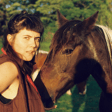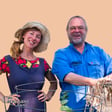
Retire by 35 with Dylan Graves
Sit down and whip out your preferred pen* because Dylan Graves is doing back-of-the-envelope calculations to show you how to access land within three to five years.
I know, sounds weirdly left-brained for our whimsical podcast, but fear not, this conversation with an inspiring and intensely honest permaculture teacher will have you dreaming and doing in tandem.
In the deep south of Aotearoa New Zealand, Dylan and his partner Evita are living and breathing Reskillience. Dylan is a permaculture teacher, biochar educator, farmer and frank-as-anything about financial pathways that lead to both personal freedom and a low-resource lifestyle that respects nature’s limits. He also covers these tantalising topics:
Should permaculture courses be cheaper?
Should we all earn radically less?
Jobs no-one is doing in permaculture.
So many options for low-cost living.
Insights as a Workaway host.
Total weekly income.
Living on 10k per year.
Educational holidays.
Accepting financial gifts from friends.
Money taboos.
Small livelihoods.
Anger as a driver.
Forced to farm!
Permaculture sheep farming.
Introverted permaculture teacher lyfe.
Biochar conspiracies.
*The hierarchy of pens is: Quill + ink > any Japanese pen > old school fountain pen > Artline 220 Series Superfine Point Black 0.2mm > all other pens.
LINKY POOS 🧙♀️
A great chat with Dylan on the Quorum Sense podcast
The Great Simplification Podcast



















